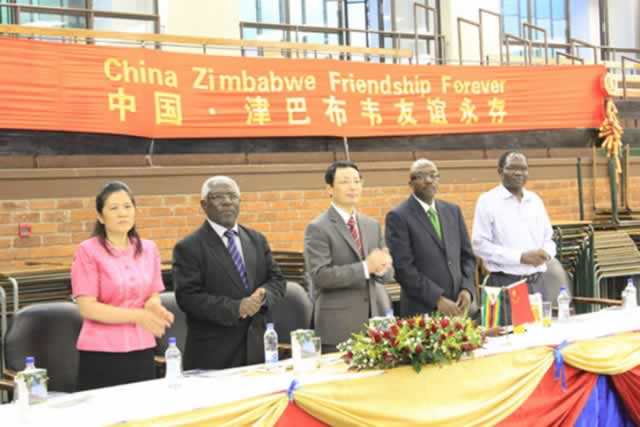UZ tops Africa in teaching Chinese language, culture


Taking a cue from the Government ’s “Look East” policy, the University of Zimbabwe consolidated the friendly relations by establishing a Confucius Institute, a centre dedicated to teaching the Chinese language and culture since 2006
Correspondent
As the Republic of Zimbabwe continues to cement its bilateral relations with the People’s Republic of China, which dates back to Zimbabwe’s liberation, there is a dire need to understand the Chinese language and culture.
The reason being that China is the fastest growing economy in the world and because of its huge population, Zimbabwe needs to tap into trade and investment with the Asian giant.
The University of Zimbabwe will on September 27 2014, join the rest of the world in celebrating the 10th Anniversary of the Global Confucius Institute since its establishment in 2004.
A wide range of academic and cultural activities are lined up for 26 and 27 September 2014.
Taking a cue from the Government of Zimbabwe’s “Look East” policy, the University of Zimbabwe consolidated the friendly relations by establishing a Confucius Institute (CI), a centre dedicated to teaching the Chinese language and culture since 2006.
The CI was established through a Memorandum of Agreement (MoA) signed between the University of Zimbabwe and the Confucius Institute headquarters, which is a Chinese government education agency, commonly known as Hanban, and also Renmin University of China.
Renmin University of China is popularly known as the People’s University because it is the oldest Humanities University in China and it is ranked the top university in Chinese Arts and Humanities focussing on language, literature and cultural studies; international relations, law, business studies as well as economics.
The First Lady of Zimbabwe, Her Excellency Dr Grace Mugabe became the first international student under the University of Zimbabwe and Renmin University of China Agreement to register for and to successfully complete a BA Honours degree in Chinese Studies.
The Confucius Institute at the University of Zimbabwe is one of more than 400 Confucius Institutes scattered all over the world, with the majority being in the United States of America, Asia, Oceania and Europe. Africa and South America have the least number of institutes with Africa currently at 40 only. The University of Nairobi was the first to establish a Confucius Institute in 2005, followed by the University of Zimbabwe in 2006.
However, the University of Zimbabwe CI is ranked among the best on the African continent.
The criteria for ranking Confucius Institutes include effective management and operational efficiency; range and quality of programmes; enrolment and quality of teaching; training of local expertise; research and community service; student scholarship uptake and students participation and performance at international language proficiency competitions.
The University of Zimbabwe CI has excelled in all these areas.
In 2007 the university introduced Chinese Studies as a Bachelor of Arts subject, allowing students to major in Chinese. By then, the UZ had already begun offering non-degree courses to members of the public and or organisations.
In order to sustain the teaching of Chinese at the university, and to develop a base for training teachers for other levels of education in the country, UZ has created permanent lectureship positions and selected seven academically gifted students from the first graduates majoring in Chinese, who were sent to China where they spent one year of intensive Chinese language studying and then two years Masters in Teaching Chinese Languages as a Second Language. That team became the first black Zimbabwean lecturers to teach Chinese at degree level in the history of Zimbabwe. All seven are at various stages of their doctoral studies, as the UZ now requires all academic staff to have doctorate degrees.
Zimbabwe scored a first in this regard, because it is the only country in Africa to have such a large number of indigenous Zimbabweans with a Masters degree in Chinese and teaching the language and culture at that high level.
Rising enrolment
Since 2007, the enrolment for Chinese at degree level has continued to rise.
Apart from students registered for the BA programme, other students registered for the degree in Tourism and Hospitality are also taking Chinese language for one year. Students registered for other programmes can also take Chinese courses to enhance their degree profiles, and to increase their career prospects, both locally and internationally.
From 2007, at least 600 students have studied some Chinese courses; about 70 undergraduate students have had a chance to spend at least one month in China, for the International Summer School and about 30 students have received scholarships to further their studies in China after successfully completing their first degrees with UZ.
Some of the students pursue postgraduate studies in other disciplines such as medicine, pharmacy, international relations, psychology, engineering, and others.
The University of Zimbabwe administers international Chinese proficiency tests (HSK) to its students or other learners who wish to prepare for enrolment at any Chinese university. Most of the UZ students majoring in Chinese will have passed these tests and competent to translate documents, interpret conversations and presentations.
Some of them end up being employed by Chinese companies, banks and private organisations.
The Confucius Institute Director, Professor Pedzisai Mashiri says: “Our Government should take advantage of this highly successful programme and utilise the skills for value addition in its engagement with China at various levels. Graduates who majored in Chinese, who are proficient in the language and culture, can be employed in various Government departments, including immigration, ZIMRA, security apparatus, foreign affairs, industry and commerce, and at the national airline . . . ”
The University of Zimbabwe has a vibrant Chinese choir for students which has performed in Botswana, Kenya and China, and at various functions hosted by the University of Zimbabwe and the Chinese embassy.
On Friday 26 September, the choir will perform together with the Zimbabwe College of Music choir at the University Great Hall during the colourful 10th Anniversary celebrations.
One of the features of the celebrations is the historic achievements by an undergraduate student majoring in Chinese, Anesu Mhembere, who came out in the top five internationally and top in Africa in the 2014 International Chinese Bridge Competitions.
Professor Mashiri added that the Confucius Institute is a bridge for inter-language and cross-cultural communication. Some of these organisations have already shown interest in learning Chinese or training their staff in Chinese language.
These are annual international Chinese language proficiency and Chinese cultural knowledge competitions contested by more than 150 university students from all over the world.
Anesu is currently working for Ecobank on a part-time basis. Last year, another University of Zimbabwe student, Michael Mashakada also came first in the same competitions. The Chinese government has offered both Anesu and Michael four-year full scholarships to study in China.
Spreading
The teaching of Chinese in Zimbabwe is spreading. There are now a number of private institutions offering Chinese, but the University of Zimbabwe offers Chinese to Alexandra Primary School, Roosevelt High School, Churchill Boys High School in Harare, as extra-curricular activities and at Midlands Christian College in Gweru, Morgan Zintec College and Chinhoyi Institute of Technology. These institutions enjoy Confucius Classroom status.
Students from these institutions can benefit from scholarships through the University of Zimbabwe. Already four students from Roosevelt and four from Churchill received sponsorship to travel to China and some of them will pursue their studies there.
As the University of Zimbabwe celebrates the 10th Anniversary of the Confucius Institute, and the teaching of Chinese in Zimbabwe, it pays tribute to the Ministry of Higher and Tertiary Education Science and Technology Development, and the Chinese Embassy for the continued support to the CI programme and dedicates the celebrations to all its students, past and present, who embraced the institution’s internationalisation drive through the learning of Chinese language and culture.
Knowledge of, and proficiency in Chinese, in addition to English, offers Zimbabwean students strong competitive advantage in the global village.
It is indeed the hope and desire of the Confucius Institute at the University of Zimbabwe that the seeds sown by the establishment of the institute will nourish the warm and friendly relations between Zimbabwe and China and stimulate inter-cultural co-operation between the two peoples.
This mutual co-operation has not ended with Zimbabweans studying Chinese language and culture, because the University of Zimbabwe is engaging Renmin University of China to introduce teaching of Shona language and Zimbabwe culture to Chinese students in an effort to promote inter-cultural communication, to enhance international understanding.









Comments